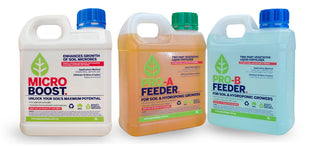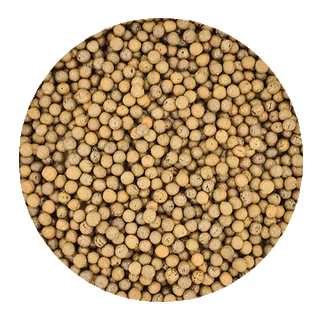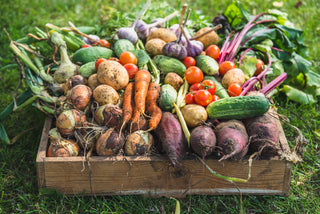When planning your garden, the choice of seeds plays a crucial role in determining the success of your crops. From traditional heirlooms to modern hybrids, each type of seed offers unique benefits and considerations. Additionally, understanding the various seed treatments available can help you make informed decisions to maximize your garden's potential. In this post, we'll explore three main types of seeds—F1 Hybrid, Open-Pollinated, and Heirloom—and discuss common seed treatments used in commercial and home gardening.
Types of Seeds
1. F1 Hybrid Seeds
F1 Hybrid seeds are produced by cross-breeding two distinct parent plants, resulting in offspring with enhanced traits such as higher yields, better disease resistance, and improved flavor. These seeds are popular among commercial growers and home gardeners looking for uniformity and performance.
| Advantages | Disadvantages |
|---|---|
| Superior Traits: High yields, disease resistance, improved flavor and appearance. | Higher Cost: Due to specialized breeding processes, F1 hybrid seeds are generally more expensive. |
| Uniformity: Consistent crops, ideal for both commercial and home gardening. | Seed Saving Limitations: Seeds from F1 hybrids do not reliably reproduce the same traits in subsequent generations. |
| Enhanced Performance: Bred for specific conditions, leading to better growth and productivity. | Dependence on Purchased Seeds: New seeds must be purchased each year for optimal performance. |
| Disease and Pest Resistance: Reduced need for chemical treatments, improved plant health. | Varietal Limitations: Not all plant varieties are available as F1 hybrids. |
2. Open-Pollinated (OP) Seeds
Open-Pollinated seeds are produced through natural pollination methods, allowing them to be saved and replanted each season. These seeds offer a sustainable option for gardeners who value genetic diversity and the ability to save seeds for future planting.
| Advantages | Disadvantages |
|---|---|
| Seed Saving: OP seeds can be saved and replanted, maintaining the same traits as the parent plants. | Variability: Natural pollination can lead to some variation in crops. |
| Genetic Diversity: Contributes to the preservation of plant genetic diversity. | Disease Susceptibility: OP seeds may not have the same resistance as hybrids, requiring more care. |
| Cost-Effective: Reusable seeds make OP varieties more economical in the long term. | Lower Yields: May produce lower yields compared to hybrids. |
| True-to-Type: Produces plants true to the original variety when properly isolated. | Cross-Pollination Risk: OP plants can cross-pollinate with other varieties, leading to unintended hybrids. |
3. Heirloom Seeds
Heirloom seeds are a subset of open-pollinated seeds that have been passed down through generations, often for over 50 years. These seeds are valued for their rich history, unique flavors, and the ability to save seeds for future use.
| Advantages | Disadvantages |
|---|---|
| Rich History: Connects gardeners to traditional agriculture and cultural heritage. | Lower Yields: Heirloom varieties may produce lower yields compared to modern hybrids. |
| Unique Flavors and Traits: Offers diverse and distinct characteristics not found in modern varieties. | Susceptibility to Pests and Diseases: May require more care and attention due to lower resistance. |
| Seed Saving: Like other OP seeds, Heirlooms can be saved and replanted each season. | Limited Availability: Not all plant varieties are available as Heirlooms. |
| Genetic Diversity: Helps preserve agricultural biodiversity and the resilience of food systems. | Variability: Natural pollination can lead to some variation in the plants. |
Seed Treatments
Seed treatments are applied to enhance seed performance and protect against pests, diseases, and environmental conditions. Below are some common treatments:
1. Thiram Coating
Thiram is a fungicide commonly used to protect seeds from fungal diseases during germination. It is particularly effective in preventing seedling blight and damping-off.
| Benefits | Considerations |
|---|---|
| Disease Protection: Reduces the risk of fungal infections during germination. | Handling Precautions: Requires careful handling, as Thiram can be harmful if ingested or inhaled. |
| Improved Germination Rates: Increases the likelihood of successful seedling establishment. | Not Organic: Thiram is a chemical treatment and is not suitable for organic gardening. |
2. Organic Porcelain Coating
This type of coating is used to encase seeds in a thin, organic layer, often for the purpose of making them easier to handle and sow, especially with mechanical seeders in commercial settings.
| Benefits | Considerations |
|---|---|
| Facilitates Sowing: Coating creates a uniform shape, allowing for even suction and precise seed placement in automated seeders. | Cost: Organic coatings may add to the overall cost of the seeds. |
| Organic-Friendly: Suitable for organic gardening, providing a natural option for seed treatment. | Limited Availability: Not all seeds are available with organic coatings. |
3. Inoculation
Inoculation involves treating seeds, especially legumes, with beneficial bacteria or fungi to enhance nitrogen fixation and improve soil health.
| Benefits | Considerations |
|---|---|
| Enhanced Growth: Promotes healthier plants and improved yields by boosting nitrogen availability. | Specificity: Inoculants are often crop-specific, requiring the correct strain for each type of legume. |
| Sustainable: Reduces the need for chemical fertilizers by naturally enhancing soil fertility. | Storage and Handling: Inoculants require proper storage and handling to remain effective. |
Conclusion
Choosing the right type of seed and understanding the available treatments are essential steps in planning a successful garden. F1 hybrids offer performance and uniformity, while open-pollinated and heirloom seeds provide sustainability and diversity. Seed treatments like Thiram, organic coatings, and inoculation further enhance seed performance, each with its own set of benefits and considerations. By making informed choices, you can ensure that your garden thrives, whether you're growing for personal enjoyment or commercial production.





